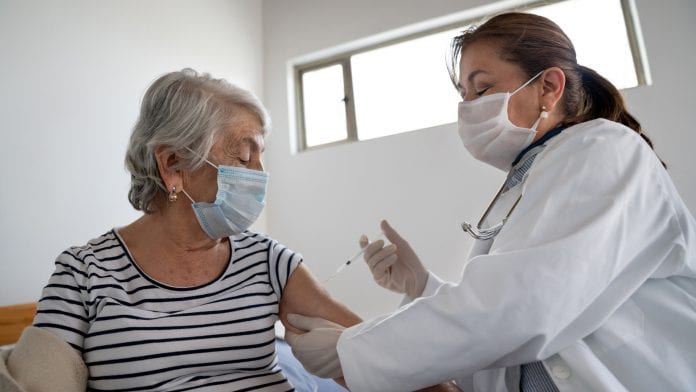
Delaying the second Pfizer vaccine dose to 12 weeks significantly increases antibody resistance in older people, a new study has found.
Researchers at the University of Birmingham, in collaboration with Public Health England, have found that antibody response in people aged over 80 is three and a half times greater following administration of the second Pfizer vaccine, compared to those who have it at a three-week interval.
The study, supported by the UK Coronavirus Immunology Consortium, of 175 people who were aged over 80 and living independently is the first direct comparison of the immune response in any age group between those who are given the second Pfizer vaccine at a three-week interval and those at a 12-week interval. The Pfizer vaccine was originally authorised for a three-week interval between doses, but several countries have expanded this to a 12-week interval to allow a higher percentage of the population to receive one vaccine dose quicker.
The research, which has been published as a preprint and therefore not yet peer reviewed, was jointly funded by UK Research and Innovation (UKRI) and the National Institute for Health Research (NIHR) and supported by the British Society for Immunology.
Peak antibody response
The research found that extending the second dose interval to 12 weeks increased the peak SARS-CoV-2 spike specific antibody response 3.5-fold. Although the peak cellular immune responses were lower after the delayed second vaccine, responses were comparable between the groups when measured at a similar time point following the first dose.
The team concluded that extending administration of the second Pfizer vaccine to 12 weeks potentially enhances and extends antibody immunity, which is believed to be important in virus neutralisation and prevention of infection.
First author Dr Helen Parry, NIHR Academic Clinical Lecturer at the University of Birmingham, said: “SARS-CoV-2 vaccines have been remarkably effective in providing large-scale protection against infection and symptomatic disease – but many questions remain regarding their optimal delivery for provision of effective and sustained immunity.
“This is the first time antibody and cellular responses have been studied when the second vaccine is given after an extended interval. Our study demonstrates that peak antibody responses after the second Pfizer vaccine are markedly enhanced in older people when this is delayed to 12 weeks.
“This research is crucial, particularly in older people, as immune responses to vaccination deteriorate with age. Understanding how to optimise COVID-19 vaccine schedules and maximise immune responses within this age group is vitally important.”
To carry out the research, the team took blood samples for analysis in the lab after participants’ first vaccine and then again two to three weeks after participants had received their second vaccine. Of the cohort, 99 participants had the second vaccine at three weeks, while 73 had the second dose at 12 weeks.
Participants who had previous infection (10 in the three-week interval group and five in the 12-week interval group) were excluded from the analysis as previous infection has been shown to have a major impact on the immune response to vaccination.










